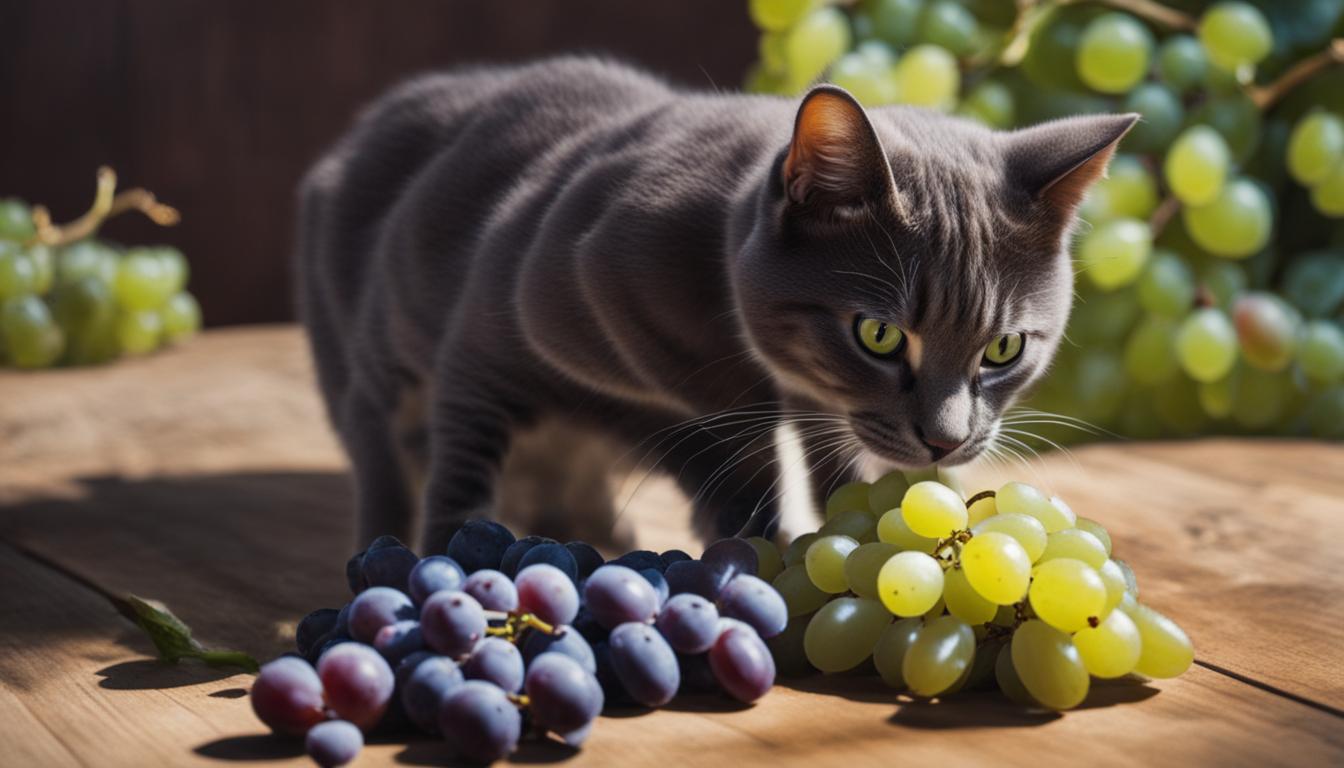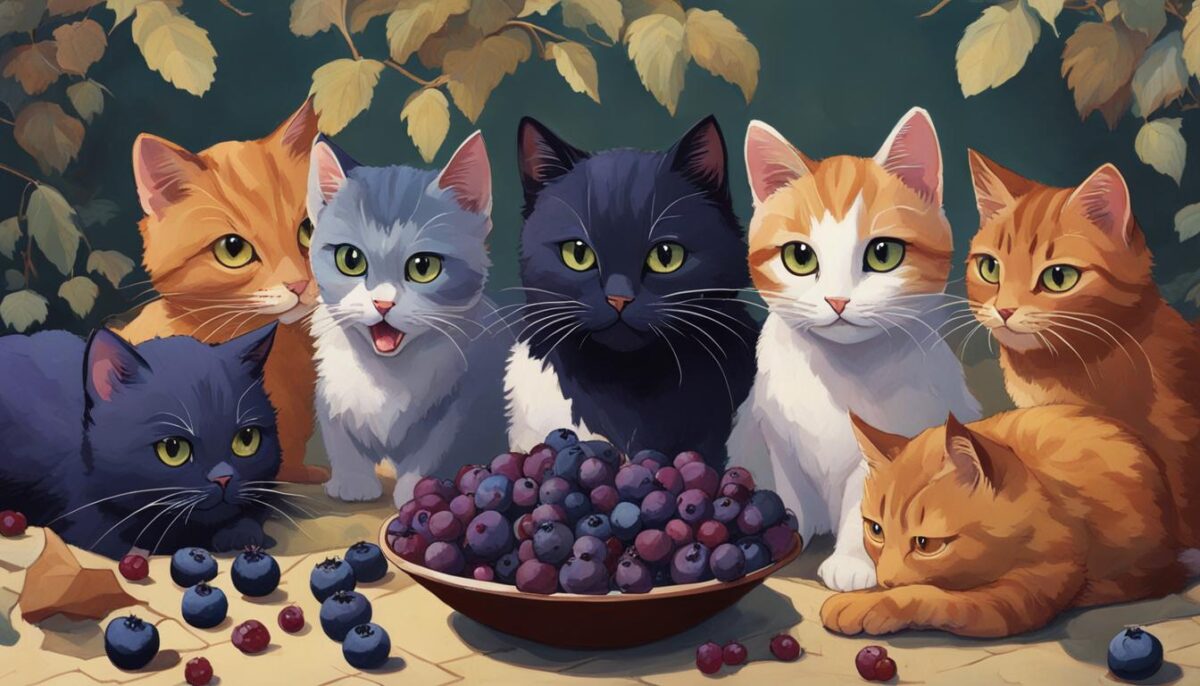Welcome to our blog post about the dangers of grapes for cats. If you are a cat owner, it’s important to know which fruits are safe for your furry friend and which ones can be harmful. In this article, we will discuss the toxicity of grapes for cats and provide you with information on safe fruits that you can offer as treats. So let’s dive in and find out why grapes and cats don’t mix well!
The Toxicity of Grapes for Cats
Grapes, both the fruit and raisins, are highly toxic to cats. They contain a substance that is harmful to cats’ kidneys and can lead to kidney failure. Even a small amount of grapes or raisins can be dangerous for cats and can cause symptoms such as vomiting, diarrhea, abdominal pain, and decreased appetite. In severe cases, grape ingestion can even be fatal for cats. As a responsible cat owner, it is important to keep grapes and raisins out of your pet’s reach to prevent any potential harm.
The toxic effects of grapes on cats are not fully understood, but it is known that not all cats will have a severe reaction to grape ingestion. However, since there is no way to predict which cats may be more sensitive, it is recommended to avoid feeding grapes to all cats. If you suspect that your cat has consumed grapes or raisins, it is essential to seek immediate veterinary care as prompt treatment can make a significant difference in their outcome.
Toxicity from grapes and raisins can occur within hours or may be delayed for up to 48 hours after ingestion. If you notice any symptoms or suspect grape consumption, it is crucial to contact your veterinarian right away. The vet may induce vomiting, administer activated charcoal, and provide supportive care to minimize the absorption of the toxic substances and prevent further complications. Early intervention is key to the successful treatment of grape toxicity in cats.
In summary, grapes and raisins are extremely toxic to cats and should never be given to them. The toxic compound present in grapes can cause kidney failure in cats, which can be fatal. If you suspect that your cat has ingested grapes or raisins, seek immediate veterinary attention. Remember to keep grapes and raisins out of your pet’s reach to ensure their safety and well-being.
Safe Fruits for Cats
While grapes are toxic to cats, there are several safe fruits that they can enjoy in moderation. These fruits can provide cats with essential vitamins and minerals without posing any harm to their health. Here are some examples of safe fruits for cats:
- Apples (without the seeds): Apples are a great source of fiber and can help with digestion. Just make sure to remove the seeds as they contain small amounts of cyanide, which can be harmful to cats.
- Blueberries: Blueberries are packed with antioxidants and can be a tasty treat for your feline friend. They are low in calories and can even help improve cognitive function.
- Watermelon (without the rind): Watermelon is a hydrating fruit that can provide cats with a refreshing snack. Make sure to remove the rind and seeds before offering it to your cat.
- Bananas: Bananas are a good source of potassium and can be a healthy addition to your cat’s diet. However, make sure to offer them in moderation as they are high in natural sugars.
When introducing new fruits to your cat’s diet, it’s important to do so gradually and in small quantities. This will help ensure that your cat tolerates the new food well and doesn’t experience any digestive issues.
| Fruit | Can Cats Eat? | Benefits | Precautions |
|---|---|---|---|
| Apples | Yes | Source of fiber, aids digestion | Remove seeds |
| Blueberries | Yes | High in antioxidants, improves cognitive function | Offer in moderation |
| Watermelon | Yes | Hydrating, refreshing | Remove rind and seeds |
| Bananas | Yes | Source of potassium | Offer in moderation |
By offering safe fruits in moderation, you can treat your cat to a variety of flavors while ensuring their overall well-being. Always consult with your veterinarian before introducing any new foods to your cat’s diet to ensure their safety and to address any specific dietary concerns or allergies they may have.
Conclusion
In conclusion, it’s important to remember that grapes are toxic to cats and should never be fed to them. The presence of a harmful compound in grapes can lead to kidney failure in felines, causing severe health issues. Therefore, it’s crucial for cat owners to be aware of the dangers of grapes and to keep them out of their furry friends’ reach.
Instead of grapes, there are several safe fruits that cats can enjoy in moderation. Apples (without the seeds), blueberries, watermelon (without the rind), and bananas are some examples of fruits that can provide essential vitamins and minerals without posing any harm to their health. However, it’s important to introduce new foods to your cat’s diet slowly and in small quantities to ensure they tolerate them well.
Remember, the well-being of your cat is of utmost importance. It’s always a good idea to consult with a veterinarian before introducing any new foods to your cat’s diet to ensure their safety. By being mindful of what your cat eats and avoiding toxic fruits like grapes, you can ensure that your feline friend stays healthy and happy.
FAQ
Can cats eat grapes?
No, grapes are toxic to cats and should never be fed to them.
What happens if a cat eats grapes?
Grapes contain a toxic compound that can cause kidney failure in cats. Even a small amount can be harmful and lead to symptoms such as vomiting, diarrhea, abdominal pain, and decreased appetite.
Are raisins also toxic to cats?
Yes, raisins are made from grapes and are equally toxic to cats. They should be avoided just like grapes.
Can cats have any fruits?
Yes, there are safe fruits that cats can enjoy in moderation. Some examples include apples (without the seeds), blueberries, watermelon (without the rind), and bananas. These fruits provide essential vitamins and minerals without posing any harm to cats’ health.
How should I introduce new fruits to my cat’s diet?
It’s important to introduce new foods slowly and in small quantities. This allows you to monitor your cat’s tolerance and ensure that they don’t have any adverse reactions.
Can grapes be fatal to cats?
In severe cases, the toxic compounds in grapes can lead to kidney failure, which can be fatal for cats. It’s crucial to keep grapes and raisins away from cats to prevent any potential harm.
What should I do if my cat accidentally eats grapes?
If your cat consumes grapes or raisins, it’s essential to contact your veterinarian immediately. They can provide guidance on the best course of action to minimize any potential harm.

